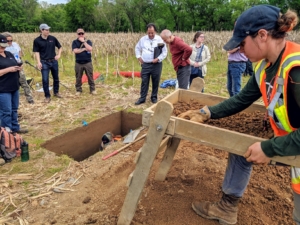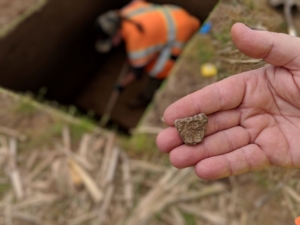Staff members from the North Carolina Office of State Archaeology, the North Carolina Commission of Indian Affairs and the U.S. Army Corps of Engineers participated in an archaeological site visit on April 25, 2019 along the proposed MVP Southgate project route in Rockingham County, North Carolina.
The visit was designed to provide members of state and federal agencies and Native American tribes with an opportunity to witness Phase II cultural surveying and archaeological testing, and discuss the surveying activities with professional archaeologists on site.
The event, according to John Mintz, North Carolina state archaeologist, was very informative and thorough. “It was very well presented,” he said.
Mintz and other attendees watched as project crew members, who were midway through testing, used hand tools to carefully excavate 1 meter by 2 meter pits (approximately 3 feet by 6 feet). They had unearthed several ceramic pottery fragments, or potsherds, that appeared to date back as many as 1,000 years.
While none of the discoveries appeared uncommon or indicated signs of a permanent settlement, each was packaged and prepared for delivery to a lab, where the items are cleaned, evaluated and catalogued. The potsherds and any other artifacts taken for processing are ultimately returned to the landowner or, at the landowner’s direction, provided to state officials for curation, in accordance with state law.
Cultural surveys are one of several types of surveys required prior to construction of the proposed interstate natural gas transmission pipeline. These surveys also are performed for other types of linear infrastructure, including highways, and help to reveal a region’s history and areas of cultural significance.
The MVP Southgate team is committed to the responsible and safe construction of the proposed pipeline and has worked hard to minimize potential impacts on the environment and communities along the project’s proposed route.
Surveying for the MVP Southgate project began in spring 2018. Phase I archaeological testing involved digging small shovel holes about 1 meter deep and spaced about 15 meters apart in a grid pattern. Results of those efforts informed development of the Phase II process, in which crews performed the larger excavations in targeted areas between small shovel holes that produced artifacts.
In all, eight 1 meter by 2 meter pits were hand-excavated on the site. Upon completion of the field work, crews returned the area to its prior condition by backfilling each pit.
Surveying activities have been completed on more than 90 percent of the MVP Southgate’s proposed 74-mile route. The project’s application for a Certificate of Public Convenience and Necessity is under review by the Federal Energy Regulatory Commission.
The project team anticipates receiving the necessary permits and approvals in time for construction to start in 2021. The MVP Southgate project is targeted to enter service in 2022.








